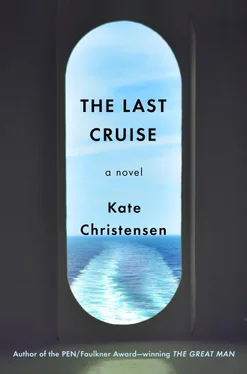The waiters, wherever they were from, moved efficiently around the table with hand-lettered menus, pouring wine. “Oh, lobster thermidor,” said Tye Blevins on Christine’s right. “They served it once in New Haven. An even blacker black tie event. It’s cool. It comes right in the lobster shell.”
The muted, entangled, melodic sounds from the stringed instruments, the wafting heat from the candles, and all the wine made Christine feel overheated. She slipped off her shawl, intending to drape it over the back of her chair, but a waiter was there at her elbow to take it. “Let me know when you’d like to have it again, miss,” he said very quietly.
As the salads were served, iceberg wedge with Roquefort dressing, Christine glanced at the head of the table and met the captain’s eyes. She realized with a flattered rush that his gaze felt frankly lustful. She leaned forward with feigned innocent absorption in what James was saying across the table from her, to show off her cleavage. Inwardly, she was laughing at herself for being so blatant, but she was totally unable to resist this temptation. The captain’s blue eyes looked hot and glinting when she darted a glance back to him to see whether he was still watching. All through the dinner, as she ate the luscious lobster dish and drank her wine and made conversation with everyone around her, there was a thin, buzzing wire stretched tightly between her and Captain Jack, so tightly that if one of them leaned back, the other felt the pull. Christine allowed herself to enjoy this even as her wedding ring shone on her left hand. She was far from her husband, in the middle of the ocean, and this was harmless, for God’s sake.
At the foot of the table, Larry Weiss had assumed control of the conversation. His voice was penetrating, sharp as a radio. Christine had never met a billionaire before. She wondered if they all, like Larry, existed in this weird ultra-concentrated, individually wrapped atmosphere. It was nothing he said or did. He was understated and subtle. But his abstract, intangible assets somehow magnetized him, transferred themselves to his body itself, so he was able to be rich and powerful without doing anything. He seemed preternaturally relaxed. He laughed, a full, genuine laugh, ringing and merry and warm, and for some reason, against Christine’s own will, she laughed along with him although she hadn’t heard the joke. It was impossible not to.
Between the entrées and dessert, Kimmi stood and dinged her wineglass. The table went quiet. “Ladies and gentlemen, allow me to present to you the chef whose cuisine you’ve been enjoying on this cruise—coming to us from Brussels, Belgium, Chef Laurens van Buyten!”
A pale, slight, bespectacled man swathed in white materialized behind her from out of the candlelight.
“Thank you,” said the chef, formally, in a clipped, accented voice. “It is nice to see you all. I am very honored and delighted to be the executive chef on the famous Queen Isabella for her last voyage.” He paused with professional calm for the patter of applause, then went on. “I have brought Chef Miklos Szabo to talk a little bit about one of the dishes we’ve made for you tonight.”
And there was that guy Christine had seen in Long Beach, in the hotel bar. He was swathed in white like his boss, but he was as different-looking from him as one European white man could be from another of roughly the same age. Laurens looked like someone who’d been bullied and teased in school and was touchy and sensitive because of it. Mick, by contrast, was broad-chested and pugnacious-looking. He looked like he could have been doing the bullying.
“Lobster thermidor,” Mick began without any pleasantries or preamble, and with an accent so slight he could almost have been American, “was invented in 1894 in a restaurant called Marie’s in the theater district of Paris. Tonight, I used the recipe by the late Julia Child from her book Mastering the Art of French Cooking, in honor of the era when the Queen Isabella was built.”
“Thank you very much, Chef Mick,” said Laurens van Buyten during the ensuing applause.
“I’d like to add,” said Chef Mick, who appeared to Christine to be trying to impress his boss, “a small story of when I was a young student, in Budapest.”
Laurens’s face remained impassive, but Christine thought she detected a very slight but clearly displeased flare of one nostril.
“To pay for my university, I learned to cook from the chef at the Eszterházy Restaurant, which was part of the Hungarian Folkloric Theater. Chef Viktor taught me to serve lobster thermidor over buttered egg noodles, a Hungarian touch. Tonight, I have done the same in his honor. I hope you have all enjoyed it.”
Laurens clapped Mick on the shoulder with one hand. “Thank you, Chef,” he said. “Please save your private memoirs for old age.”
Mick grimaced at the low murmur of laughter from the table and made a hasty, apologetic gesture that Laurens ignored. Then he was gone, banished to the galley, Christine surmised, in disgrace for stealing his boss’s show and overstepping.
“And for dessert,” Laurens said, “we have a classic that was a great hit in the 1950s, back when the Isabella was first built… Baked Alaska, or la surprise du Vésuve à la Julia Child.”
The lights were dimmed. To even more applause, the battery of waiters streamed in, each one carrying a tray on which a meringue had been set aflame. The scent of burning rum filled the air.
By the time the diners had looked up from their plates with near-universal expressions of childish happiness, the chef had gone.
“And finally,” said Kimmi, “I would like to present Tameesha, who hails from our very own home port of Los Angeles, California.”
Tameesha stood with her hands by her sides, her head thrown slightly back and her eyes closed.
Even Christine was familiar with her two or three enormous hits; they were as impossible to forget as advertising jingles, repetitive tuneless ditties, half spoken, half intoned with Auto-Tune through electronic effects. She had always assumed that Tameesha couldn’t sing, was just all attitude and provocation.
But instead she started crooning “You Send Me,” by Sam Cooke, in a tender, full-throated, easygoing voice, as familiarly as if she’d been singing it for years. Her face was filled with a kind of pleasure Christine had been missing for a long time in her own life: the joy of allowing her full self to come out, not holding anything back.
When she had finished, bowing at the vigorous applause, the captain handed around a box of cigars. Christine took one, and then, when several of the men wandered out to the balcony to smoke, she and Valerie got up and joined them. The night air was soft and clean and salty. The moonlight made a gleaming path on the dark waves that ran far below with a low calm murmur. Christine and Captain Jack glanced at each other again, but it was friendly now; the flirtation had run its course. It couldn’t go anywhere but to ground. Oh well, she thought, feeling half disappointed, half relieved.
“It’s nice to meet you, sir,” said Valerie, walking straight up to Larry Weiss. “This is a great ship.”
“Thank you,” said Larry as he turned to face Valerie, leaning against the railing, rolling his lit cigar in his long fingers. “Yes, my wife has a bit of a sentimental attachment to it. This is our anniversary cruise. We own a perfectly nice private yacht, but I think she prefers the Isabella. ”
“It’s definitely peaceful,” said Valerie. “It’s amazing how far away from everything we are, out here.”
“It’s an escape,” Larry agreed. “No cell phone service, for one thing. I’m usually on three of them at once, all day every day. I feel helpless without my earpiece. But I could get used to it.”
Читать дальше












